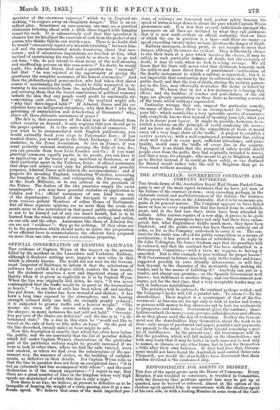OFFICIAL CONDEMNATION OF EXISTING RAILWAYS. Tin evidence of Captain Wynn
at the inquest on the persons killed by the accident on the Lancashire and Yorkshire Railway, although it discloses nothing new, imparts a new value to that which is already known. The world did not wait for the Govern- ment Inspector of Railways to inform it that the substratum of railways has yielded to a degree which renders the line unsafe; but the statement receives a new and important stamp of au- thority when it is given so explicitly as it is by Captain Wynn. When the line was originally laid down, he says, "it was never contemplated that the traffic would be so great or the locomotives so heavy." "As one line of rails has been taken off and another line put down, the timber has been wounded and shaken ; it has been a long time exposed to the atmosphere, and its bearing strength reduced fully one half, its strength greatly reduced ; it is subjected to greater traffic and a heavier weight." "The worms are worn off the screws which screw the chair to the sleeper; in many instances the nut will not hold." "Seventy- five per cent of the chairs are deficient," and the line is in "a de- teriorated state." On a line in this state he "would not like to travel at the rate of forty or fifty miles an hour." On the part of the line described, twenty miles an hour might be safe. Now this description is exactly that which has often been before the public, and we are convinced that the list of peculiar defects -which fall under Captain Wynn's observations in the particular part of the particular railway might be greatly increased if we were to look at other lines, where we find the rails twisted, worn and cracked, or where we find even the substructure of the per- manent way, the masonry of arches, or the building of embank- ments, as defective in their details. For Captain Wynn tells us that the line in question does not form an exceptional case; "it is not an extremely bad line as compared with others " : and the next declaration is of the utmost importance—" I regret to say, that there are a great number of lines in the kingdom where very high speeds are maintained of which this line is only a type." Now there is no line, we believe at present so defective as to be incapable of bearing the weight of a train passing over it at a mo- derate Speed. We believe that some of the most imperfect por-
tions of railways are traversed with perfect safety because the speed of trains is kept down to about the pace which Captain Wynn pronounces safe. It is true that several individuals amongst the passengers on all lines are irritated by what they call ;slowness. But it is now made evident on official authority, that on lines of which the one in question is a type—and there arc many—a speed exceeding twenty miles an hour involves the danger of death. Railway managers, seeking profit, do not scruple to incur that danger, although its causes are evident. They deliberately choose to run their train at a pace which involves the chance, it may be called, in each particular instance of death, but the certainty of death, it may be said, when we look to a long average. We all know that the State will never visit that deliberate homicide with the mildest and most direct form of punishment—confiscation of the deadly instrument to which a railway is converted ; but it is not impossible that confiscation may be enforced in one form by the public itself, and that the fear of death, staring the railway passen- ger in the face, may effectually neutralize the desire to travel by railway. We know that in not a few instances it is having that effect ; and the builders of coaches and post-chaises, of the old type, are already speculating on those fears as favouring a revival of the trade which railways superseded.
Particular wrongs, they say, suggest the particular remedy. On many of these lines there is an arrangement for " insuring " your life : which sounds like a very agreeable species of assurance, only everybody knows that instead of insuring your lffe, what you do is to insure your legacy. It might be possible, however, to es- tablish a railway on the principle of really rendering life secure ; and we have no doubt that in the competition of trade it would carry off a very large share of the traffic. A project to establish a SAFETY RAILWAY, with a well-constructed permanent line, rolling stock well tested in every part, sufficient attendance, and punc- tuality, would carry the traffic off every line in the country. Nay, there is no doubt that the prospect of safety would divert people even from the paths they had originally intended to travel, and that a man, for example, who meant to go to Brighton, would go to Bristol instead, if he could go there safely, or one destined for Bristol would rather take the rail to Brighton than go to Gravesend without meaning it.


























 Previous page
Previous page